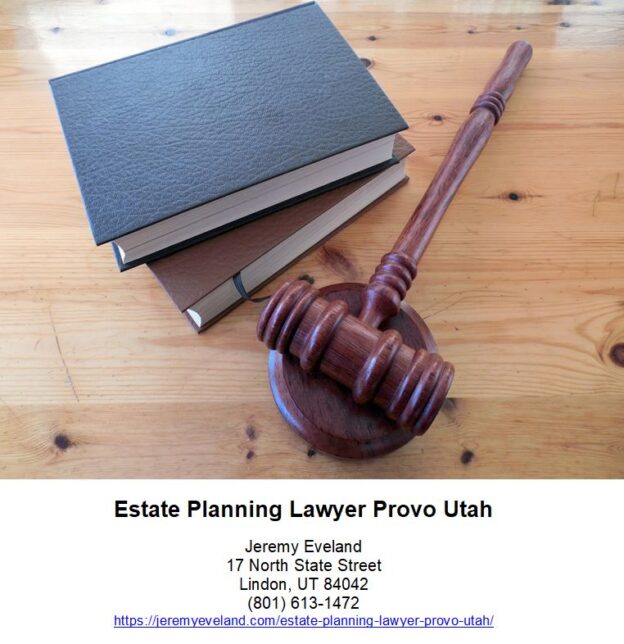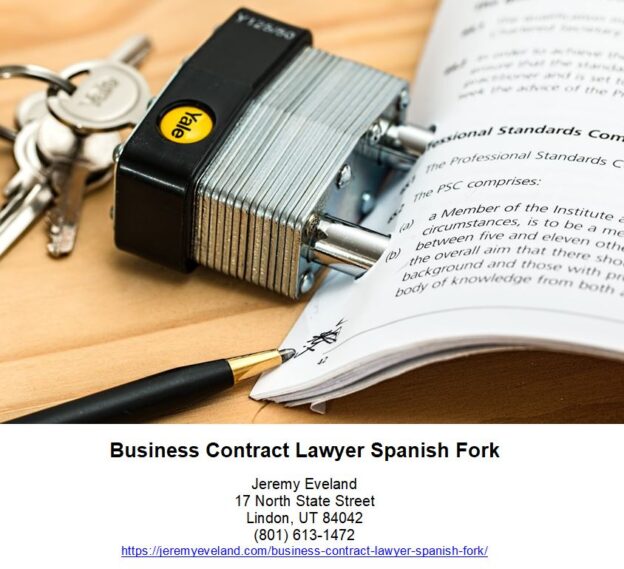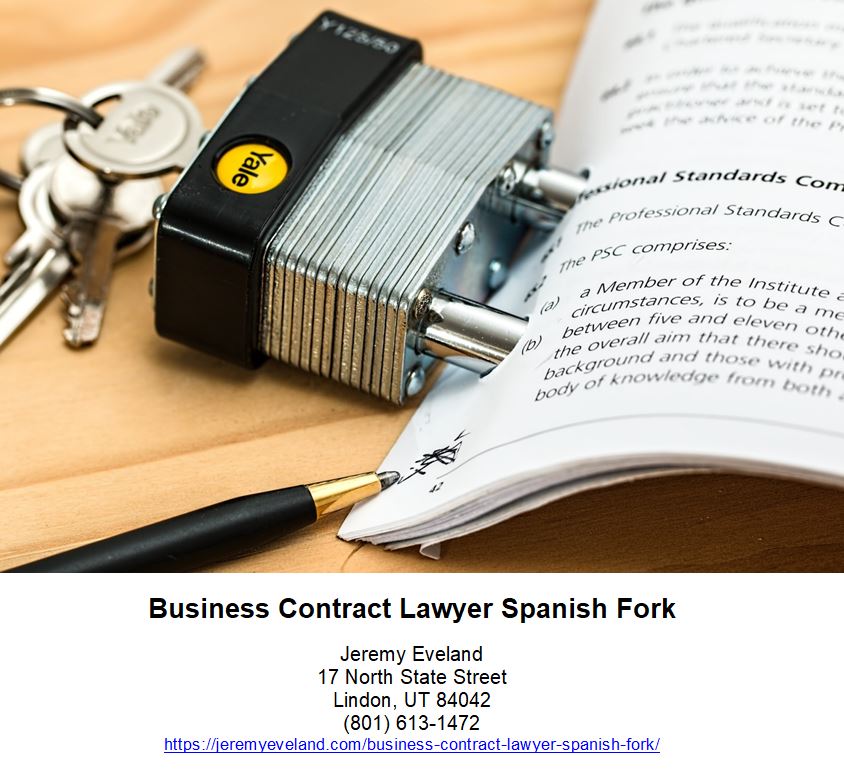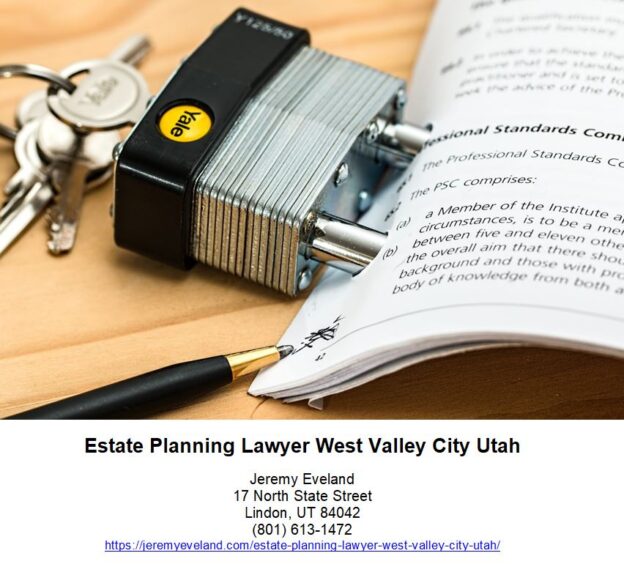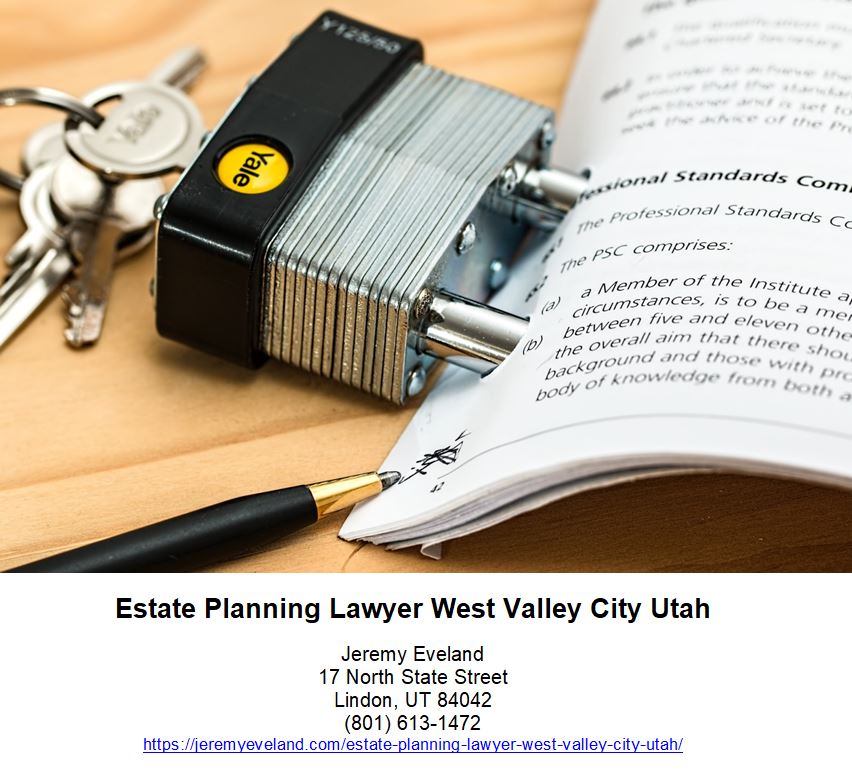Estate Planning Lawyer Provo Utah
“Secure Your Future with an Estate Planning Lawyer in Provo, Utah”
Introduction
Welcome to Estate Planning Lawyer Provo Utah! We are a team of experienced attorneys dedicated to helping individuals and families in the Provo area with their estate planning needs. Our attorneys have extensive experience in estate planning, probate, trust administration, and other related areas of law. We understand the importance of protecting your assets and providing for your loved ones, and we are here to help you create a plan that meets your needs. Whether you are looking to create a will, trust, or other estate planning document, our attorneys can provide you with the guidance and advice you need to ensure that your wishes are carried out. We look forward to helping you with your estate planning needs.
Estate Planning in Utah County: What You Need to Know About the Process
Estate planning is an important process for anyone living in Utah County. It involves making decisions about how your assets will be managed and distributed after you pass away. Estate planning can help ensure that your wishes are carried out and that your loved ones are taken care of.
The first step in estate planning is to create a will. A will is a legal document that outlines how you want your assets to be distributed after you pass away. It can also include instructions for guardianship of minor children and other important decisions. It is important to make sure that your will is properly drafted and witnessed in order to ensure that it is legally binding.
The next step in estate planning is to create a trust. A trust is a legal entity that holds assets for the benefit of another person or entity. Trusts can be used to manage assets during your lifetime and after you pass away. They can also be used to provide for the care of minor children or other dependents.
The third step in estate planning is to create a power of attorney. A power of attorney is a legal document that allows you to appoint someone to manage your affairs if you become incapacitated. This person will be responsible for making decisions on your behalf, such as paying bills and managing investments.
Finally, it is important to review your estate plan periodically. This will ensure that your wishes are still being carried out and that your assets are being managed according to your wishes. It is also important to update your estate plan if your circumstances change, such as if you move to a different state or if you have a major life event, such as getting married or having a child.
Estate planning is an important process for anyone living in Utah County. It is important to make sure that your wishes are carried out and that your loved ones are taken care of. By creating a will, trust, and power of attorney, and reviewing your estate plan periodically, you can ensure that your wishes are followed and that your assets are managed according to your wishes.
Estate Planning in Provo: Getting a Health Care Directive
Estate planning is an important part of ensuring that your wishes are respected and your assets are protected. One important part of estate planning is creating a health care directive. A health care directive is a document that outlines your wishes for medical care in the event that you are unable to make decisions for yourself.
A health care directive is a legal document that is recognized in all 50 states. It is important to note that a health care directive is not the same as a living will. A living will is a document that outlines your wishes for end-of-life care, while a health care directive is a document that outlines your wishes for medical care in the event that you are unable to make decisions for yourself.
When creating a health care directive, it is important to consider the following:
• Who will make decisions for you if you are unable to make them for yourself?
• What types of medical treatments do you want or do not want?
• Do you want to be an anatomical donor for any purpose, including research, education, advancement, transplantation, therapy, or other purposes, but excluding any purpose that would be contrary to your religious beliefs?
Once you have considered these questions and made your decisions, it is important to have your health care directive properly drafted and signed by a notary public. It is also important to make sure that your health care directive is kept in a safe place and that your family and health care providers are aware of its existence.
Creating a health care directive is an important part of estate planning in Provo. It is important to make sure that your wishes are respected and that your assets are protected. By creating a health care directive, you can ensure that your wishes are respected and that your assets are protected.
Estate Planning Attorneys in Provo: Getting a Will and a Trust
Estate planning is an important part of ensuring that your assets are distributed according to your wishes after you pass away. In Provo, there are a number of experienced estate planning attorneys who can help you create a will and a trust to ensure that your wishes are carried out.
A will is a legal document that outlines how you would like your assets to be distributed after you pass away. It can also include instructions for the care of minor children, the appointment of an executor to manage your estate, and the designation of guardians for your children. A will is an important part of estate planning, as it ensures that your wishes are carried out after you pass away.
A trust is a legal entity that can be used to manage and distribute assets. A trust can be used to manage assets during your lifetime, or it can be used to manage assets after you pass away. A trust can be used to provide for the care of minor children, to provide for the care of a disabled family member, or to provide for charitable giving. A trust can also be used to minimize taxes and protect assets from creditors.
When creating a will and a trust, it is important to work with an experienced estate planning attorney. An experienced attorney can help you understand the legal implications of your decisions and ensure that your wishes are carried out according to the law. In Provo, there are a number of experienced estate planning attorneys who can help you create a will and a trust that meets your needs.
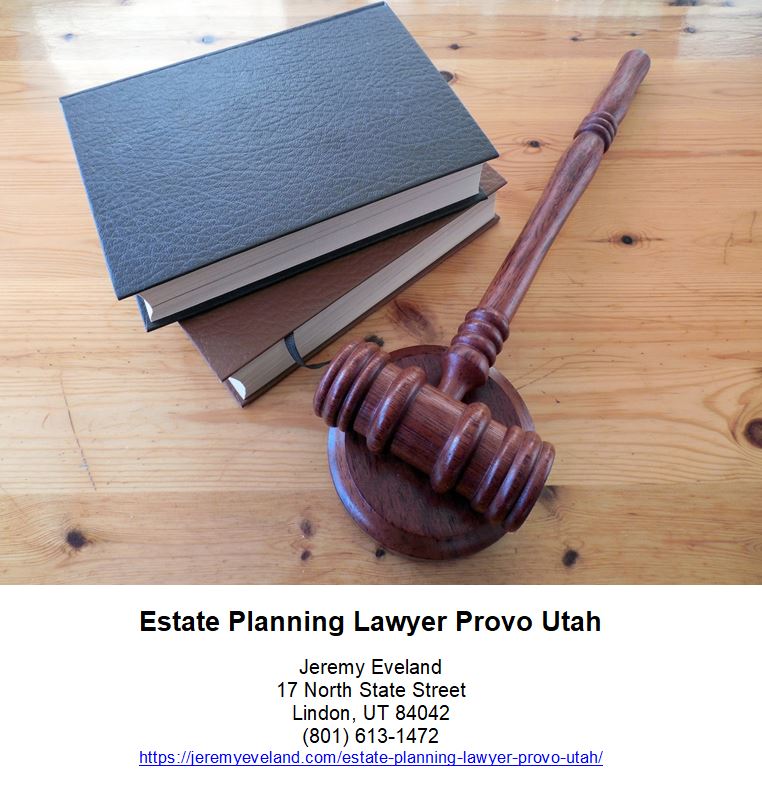
Creating a will and a trust is an important part of estate planning. Working with an experienced estate planning attorney in Provo can help ensure that your wishes are carried out according to the law.
Estate Planning Lawyers in Provo: Getting a Power of Attorney
If you are in need of estate planning in Provo, Utah, it is important to understand the various legal documents that are available to you. One of the most important documents is a power of attorney. A power of attorney is a legal document that allows you to appoint someone to act on your behalf in the event that you become incapacitated or are otherwise unable to make decisions for yourself.
When creating a power of attorney, you will need to choose an agent who will be responsible for making decisions on your behalf. This person should be someone you trust and who is familiar with your wishes and values. You will also need to decide what type of power of attorney you need. There are two main types: general and limited. A general power of attorney gives your agent broad authority to make decisions on your behalf, while a limited power of attorney only allows your agent to make decisions related to specific matters.
Once you have chosen an agent and determined the type of power of attorney you need, you will need to have the document drafted and signed. It is important to have an experienced estate planning lawyer in Provo review the document to ensure that it is legally valid and meets your needs.
Having a power of attorney in place can provide peace of mind that your wishes will be respected in the event that you become incapacitated. If you are in need of estate planning in Provo, Utah, contact an experienced estate planning lawyer to discuss your options.
Why You Should Hire Jeremy Eveland for Your Provo Estate Plan
If you are looking for an experienced and knowledgeable estate planning attorney in Provo, Utah, Jeremy Eveland is an excellent choice. With over 20 years of experience in estate planning, Jeremy has the expertise and knowledge to help you create a comprehensive estate plan that meets your needs and protects your assets.
Jeremy has a deep understanding of the complexities of estate planning and the laws that govern it. He is well-versed in the various types of trusts, wills, and other estate planning documents, and he can help you create a plan that is tailored to your specific needs. He is also knowledgeable about tax laws and can help you minimize your tax burden.
Jeremy is also an experienced negotiator and litigator. He has successfully represented clients in a variety of estate planning matters, including probate, trust administration, and guardianship. He is also experienced in estate planning litigation, and he can help you protect your assets in the event of a dispute.
Jeremy is committed to providing personalized service to his clients. He takes the time to get to know each of his clients and their individual needs, and he works hard to ensure that their estate plans are tailored to their specific goals. He is also available to answer any questions you may have about the estate planning process.
Are Your Estate Planning Fees Tax Deductible?
In general, you can deduct legal fees as an ordinary and necessary business expense. The types of legal fees that are deductible include creation and review of contracts, filing a lawsuit or defending a lawsuit for breach of contract, legal assistance to collect on an account, defending an intellectual property right, defending against lawsuits brought by employees and receiving tax advice.
The amount of the bill that can be deducted in the case of tax advice for an estate plan varies. The more that tax play a role in estate planning process, the greater the percentage of the fee that can be deducted as a qualified expense. However, it is wise to always check with your tax professional before filing this deduction on your tax return. There are times in which legal fees are a necessary evil. When you are able to deduct your legal fees, they become less of an evil.
It’s important to understand, though, which legal fees are deductible and which are not. Personal legal fees (i.e.: fees used to pay a divorce attorney or fees used to hire an attorney to dispute a lawsuit that was brought against you) are non-deductible. These are considered personal expenses by the IRS, so that means you will not be able to claim them on your list of itemized deductions. If you own a corporation, an LLC, a partnership, or even if you are a sole proprietor, legal fees associated with helping the reputation of your business will be considered a business investment and will therefore be fully deductible. The term fully deductible means that there are no limitations or AMT (Alternative Minimum Tax) associated with your deduction.
In order to claim your investment legal fees, you must legitimately be conducting business. If you are not regularly filing as a proprietor, the legal fees associated with your business may be viewed by the IRS as miscellaneous itemized deductions. If this is the case, it will result in limitations being placed on your deductions. Legal fees which are equal to up to two per cent of your AGI (Adjusted Gross Income) are non-deductible. At higher income, deductions are completely phased out. Once you compute the AMT (which is a separate tax with a rate of 28 per cent), there is no deduction whatsoever. To avoid these limitations, you should file your US income tax as a proprietor and file Schedule C (assuming you are actually in business).
There is a different set of rules for attorneys with a contingency fee. If, for example, you are awarded $1M from a lawsuit that was handled for you by a contingency attorney who receives 30% of your lawsuit earnings, you may be under the assumption that you will only be required to pay taxes on the $700K you received. This is a false notion; you will be responsible for taxes on the entire $1M balance. If the settlement was for a personal injury case, you don’t have to worry, because compensation for personal injury cases are always tax-free as long as the entire balance is for personal physical injury or physical sickness recovery. If there were punitive damages or interest, those items will be taxable.
If you have hired a contingency attorney to help with an employment suit, you will only be taxed on the amount you receive after attorney fees have already been taken out. The majority of employment lawsuits result in recoveries which are viewed by the IRS as income. Therefore, they do not qualify for the same exclusion as physical injury or sickness. A settlement will either be in the form of wages which are subject to withholding at the time they are paid out or non-wage income which will be reported on Form 1099. In most cases, legal fees for personal matters are not tax deductible. Prior to 2018, there was an Internal Revenue Service (IRS) exception that allowed the deduction of legal fees associated with estate planning. However, those fees are no longer deductible. IRS Publication clearly states that “legal fees related to producing or collecting taxable income or getting tax advice are not deductible.” Since legal fees for preparing a will are not tax deductible, it is more important than ever to get as good of a rate as possible without compromising quality.
The following are a few tips to help you strike this balance when looking for estate planning services.
The number one way to find a good attorney at a good rate is to ask the right questions. Start by asking your friends, family, and trusted coworkers if they know any estate planning attorneys that they would recommend. Ask about their experience with that attorney. Check the attorneys’ websites and make a list of a few that you would like to get more information from and reach out to them. During your initial consultation with the attorneys you are considering, ask questions about the attorney’s knowledge, training, experience and prices. Some questions you may want to ask are:
• How many years have you been practicing law?
• Where did you graduate law school?
• About what percentage of your clients are estate planning clients?
• How does the estate planning process work?
• How will you keep me updated during the process?
• How quickly do you generally return calls or emails?
• What are your rates?
• Do you offer flat rate estate planning packages?
If you like a particular attorney but their price is out of your budget, explain your situation and ask for a discount. You may or may not receive one, but it is worth a try.
Historically, there were only two options for preparing a will and other estate planning documents: by using an attorney or doing it yourself. In the past few decades, a new middle ground option has emerged: legal service providers. Legal service providers prepare form documents based on your responses to questions. They are less expensive than using an attorney but produce better documents than doing it yourself. Legal service providers are not attorneys but most use attorneys to create and update their forms. Many also offer an add-on option where you can pay a little more to be able to talk to an attorney about your estate planning documents. This is typically still much less expensive than using an estate planning attorney. Legal service providers are typically best suited for routine estate planning for low or middle income families. If you have a nontraditional family, tax situation, or very high income, an estate planning attorney that can tackle the complex issues is usually a better choice. The bottom line is that while you cannot deduct legal fees from your tax returns, you can take steps to keep your estate planning legal costs low. Estate planning fees were tax-deductible, but are no longer. First, estate planning is the general term that covers arranging one’s assets and property for distribution at death to beneficiaries. It includes the creation of legal documents such as trusts and wills, as well as that of directives such as durable power of attorney and living wills. Estate planning isn’t only for the rich. Without a plan in place, settling affairs after one’s death could have a long-lasting and costly impact on loved ones. Unfortunately, recent tax changes have made it harder, if not impossible, to continue to deduct many estate-planning fees.
IRS Rules Changed
Some estate planning fees were eligible as an itemized deduction under IRS rules for miscellaneous deductions on Schedule A, but the Tax Cuts and Jobs Act changed that at least for now. Until recently, the IRS allowed that legal fees for estate tax planning services could have been tax-deductible if they were incurred for the production or collection of income; the maintenance, conservation, or management of income-producing property, or tax advice or planning. Many provisions of the Tax Cuts and Jobs Act will sunset at the end of 2025. A political change in Washington before then could also revive some deductions. Those who planned to deduct fees for advice on the construction of such income-generating instruments as an income trust or guidance on the use of property transfer methods, for instance, will generally now be unable to deduct the cost of the fees on their tax return. Other examples of per-fee services that are no longer deductible include investment advice for trusts held by the estate and trust tax preparation.1 Some fees were not deductible before the tax changes: estate planning relating to the simple transfer of property or guardianship as is common with most wills, for instance, or the use of estate planning instruments such as powers of attorney, living wills, or the writing of trusts to prevent estate assets from having to go to probate. Fees associated with tax planning advice (i.e., minimizing estate or income taxes), tax return preparations, and resolution of tax return audits could be a deduction under IRC Section 212. Thus, estate planning legal expenses or fees could be a tax deduction, but it would be only deductible to the extent it is allocable to tax planning. Furthermore, since many taxpayers do not itemize and since miscellaneous itemized deductions often do not exceed 2% of AGI, many taxpayers will receive no benefit from these deductions. Furthermore, IRC Section 68 phases out itemized deductions for taxpayers with higher incomes (joint returns with AGI above $309,900 and single filers with AGI over $258,250). Total itemized deductions are reduced by 3% by which the AGI exceeds these thresholds.
Common Fees
There are several fees that could be associated with your estate plan, but are those estate planning fees deductible? Most common are the charges paid to attorneys to draft, review and update estate related documents such as wills, trusts, powers of attorney, healthcare proxies, and other documents. These can be paid as the documents are drafted and other services provided or on a retainer basis for those who seek ongoing services.
Effects of Tax Reform
The tax legislation taking effect in 2018 has affected several aspects of estate planning, including if estate planning is tax deductible. Previously most taxpayers deducted their estate planning fees as an itemized deduction as a “miscellaneous expense.” These deductions (which also included tax preparation fees and unreimbursed employee expenses) have been eliminated in the tax reform for tax years 2018 to 2025. For the tax implication on estates and trusts, consult your own tax and estate planning professionals. Although this may disappoint some who were hoping to deduct these expenses on their personal income tax return, there are a few reasons why this may not have as great an effect on cost as it may seem. Even when estate planning fees were deductible, it was only for expenses related to the production of income, not for all estate planning fees in general. All miscellaneous expenses were also subject to a floor of 2% of Adjusted Gross Income or “AGI.” This means that to use the deduction, the total amount of miscellaneous expenses would have needed to be more than 2% of your total income after certain adjustments (retirement account contributions, for example) leading to AGI.
You would have also needed to have total itemized deductions that exceed the standard deduction, which is why the loss of this deduction may affect even fewer taxpayers than would have otherwise been the case. Although certain deductions have been reduced or eliminated by recent tax legislation, the standard deduction has also been increased. Since a taxpayer can only use the standard deduction or itemize, there are likely fewer people that would have been affected by the loss of this deduction. Although tax reform often has the goal of reducing taxes, simplification of the process is also a common goal. You may not have as many deductions, although your overall rates may lead to lower taxes paid in general. This is similar to what happened in the 1987 tax reform during the Reagan administration. Rates were lowered but certain deductions were eliminated. You could previously deduct not only your mortgage interest but income on consumer loans including credit card debt. That said, the benefits of estate planning could be enormous independent of tax-deductible fees.
Implications to Consider
Many types of estate planning strategies have tax implications. While the estate tax will also affect fewer people under tax reform, there are still monetary advantages to estate planning such as advanced charitable gifting strategies, many of which are tax-advantaged. Avoiding probate is also a significant cost benefit for many.
Speak with a Professional
This may be an appropriate time to state the importance of making sure that you are working with quality professionals and that they are coordinated with one another on related issues. If your insurance agent offers a policy that is tax-advantaged, make sure your tax professional is aware of the implications. Your estate planning attorney, for example, may need to know when new investment accounts are opened or existing accounts transferred to weigh in on how beneficiaries should be listed or if certain accounts should be held in a trust rather than by an individual. Many aspects of your financial life relate to one another. You may have specialists for tax issues, estate planning, insurance, retirement planning, investments and other areas. You may wish to consider working with a financial planner whose objective is, in part, to make sure these areas are coordinated well with one another, taking a big picture approach to your financial situation. Whenever tax season kicks off into gear, many of us look for ways to reduce our tax liability. Some, but not all, attorney fees are eligible for deduction. It depends on the type of legal service you sought. For instance, hiring an attorney for a child custody dispute or a personal injury case are both ineligible expenses. Legal expenses related to a business, such as collecting unpaid debt, are qualifiable.
Examples of Tax Deductible Legal Fees
• Business-related expenses such as seeking advice for a startup business
• Rental property expenses such as fees paid to evict a tenant
• Employment discrimination cases
Examples of Non-Deductible Legal Fees
• Personal injury cases including workers compensation
• Criminal cases
• Estate planning disputes
Jeremy Eveland is an experienced and knowledgeable estate planning attorney in Provo, Utah. He has the expertise and knowledge to help you create a comprehensive estate plan that meets your needs and protects your assets. He is also an experienced negotiator and litigator, and he is committed to providing personalized service to his clients. If you are looking for an experienced and knowledgeable estate planning attorney in Provo, Utah, Jeremy Eveland is an excellent choice.
Q&A
1. What services does an estate planning lawyer in Provo, Utah provide?
An estate planning lawyer in Provo, Utah can provide a variety of services, including drafting wills, trusts, and other estate planning documents; advising on tax planning; and helping to manage and distribute assets.
2. What should I look for when choosing an estate planning lawyer in Provo, Utah?
When choosing an estate planning lawyer in Provo, Utah, it is important to look for someone who is experienced in the field and has a good reputation. You should also make sure that the lawyer is licensed to practice in Utah and is familiar with the laws in the state.
3. How much does an estate planning lawyer in Provo, Utah charge?
The cost of an estate planning lawyer in Provo, Utah will vary depending on the complexity of the case and the services provided. Generally, estate planning lawyers charge an hourly rate or a flat fee.
4. What documents should I bring to my initial consultation with an estate planning lawyer in Provo, Utah?
When meeting with an estate planning lawyer in Provo, Utah, it is important to bring any relevant documents, such as a will, trust, or other estate planning documents. You should also bring any financial documents, such as bank statements, tax returns, and investment accounts.
5. What is the best way to contact an estate planning lawyer in Provo, Utah?
The best way to contact an estate planning lawyer in Provo, Utah is to call their office and schedule an initial consultation. During the consultation, you can discuss your estate planning needs and the lawyer can provide advice and guidance.
Estate Planning Lawyer Provo Utah Consultation
When you need help from a Estate Planning Lawyer in Provo Utah call Jeremy D. Eveland, MBA, JD (801) 613-1472 for a consultation.
Jeremy Eveland
17 North State Street
Lindon UT 84042
(801) 613-1472
Home
Related Posts
Nursing Home Law
Business Exit Strategy
Settlement Agreement
Do I Need A Board of Directors?
Business Plan
Administrative Law
Business Market Volatility
Business Consulting
Seller Financing A Business
Management Consulting
Running a Business
Creating Business Systems
Dispute Resolution
Mediation
Arbitration
OSHA Law
Sustainable Business Model
Business Success
Management Training
Leadership Training
Estate Planning Lawyer West Valley City Utah
Business Contract Lawyer Spanish Fork
Accord and Satisfaction
Civil Litigation
Business Market Research
Corporate Attorney Riverton Utah
Advantages of Hiring a Utah Personal Injury Lawyer
Full Service Law Firm
Estate Planning Lawyer Provo Utah
[geocentric_weather id=”b6e1f4da-d96d-4229-bb2f-fc6b15899f98″]
[geocentric_about id=”b6e1f4da-d96d-4229-bb2f-fc6b15899f98″]
[geocentric_neighborhoods id=”b6e1f4da-d96d-4229-bb2f-fc6b15899f98″]
[geocentric_thingstodo id=”b6e1f4da-d96d-4229-bb2f-fc6b15899f98″]
[geocentric_busstops id=”b6e1f4da-d96d-4229-bb2f-fc6b15899f98″]
[geocentric_mapembed id=”b6e1f4da-d96d-4229-bb2f-fc6b15899f98″]
[geocentric_drivingdirections id=”b6e1f4da-d96d-4229-bb2f-fc6b15899f98″]
[geocentric_reviews id=”b6e1f4da-d96d-4229-bb2f-fc6b15899f98″]










